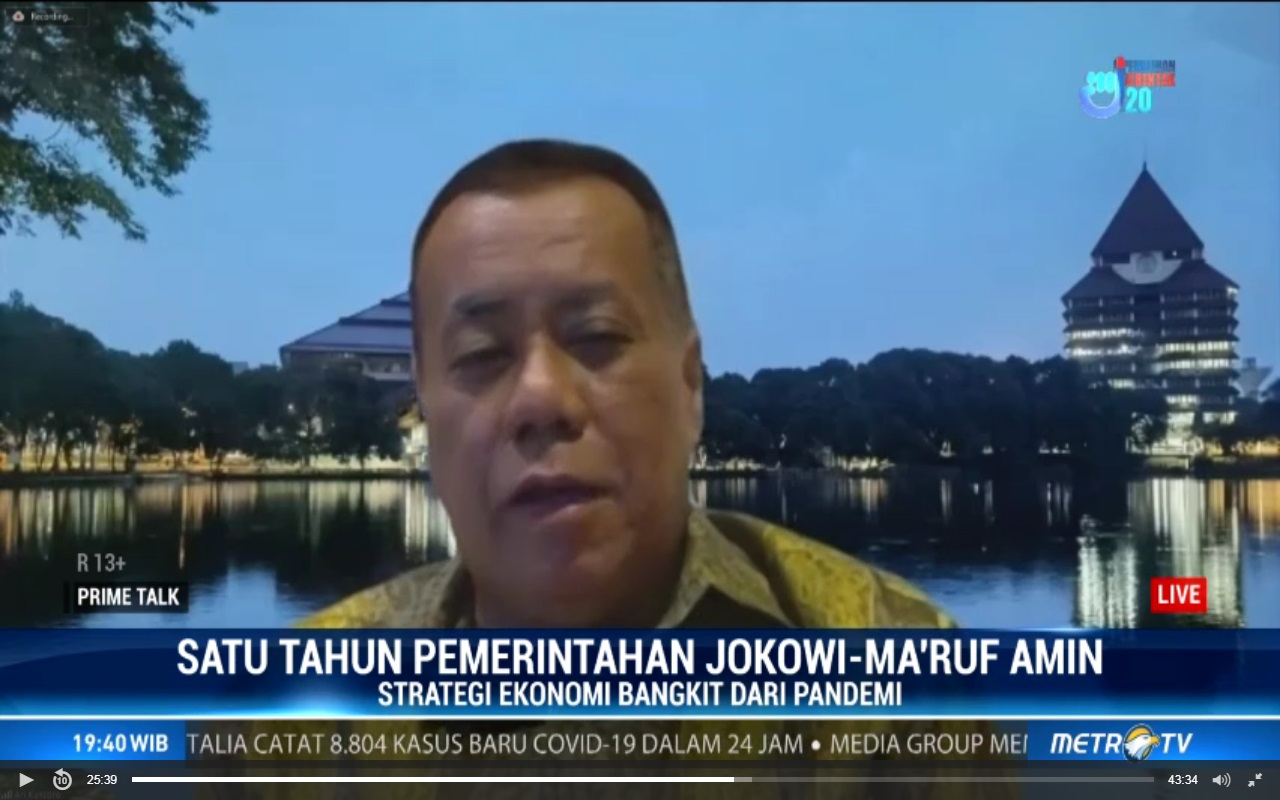Ari Kuncoro, on Metro TV: 1 Year Performance Evaluation of Jokowi-Ma’ruf Economic Sector
Hana Fajria ~ PR of FEB UI
JAKARTA – Through a plenary session, the DPR passed the Omnibus Law draft on job creation into law. In the midst of many rejections, this law is expected to improve the nation’s economy, especially during the Covid-19 pandemic. Coordinating Minister for Economic Affairs Airlangga Hartarto, Minister of Manpower Ida Fauziyah, General Chair of Apindo Hariyadi Sukamdani, Economist and Chancellor of the University of Indonesia Ari Kuncoro, provided an evaluation of the performance of Jokowi-Ma’ruf’s economic sector. The 1-year performance evaluation of Jokowi-Ma’ruf’s economic sector which is in the public spotlight is the job creation Omnibus Law.
The number of workers who lost their jobs due to Covid 19 reached 2.1 million, from whom lost half of their income to those who actually lost their income, but had not yet been laid off. When calculated, those who lost their jobs or lost their income included about 9 million people who were laid off. Minister of Manpower Ida Fauziyah explained that the government is providing assistance for workers in the midst of this pandemic, such as preparing vocational training and incentives (salary subsidies) for 4 months. Those who are still working, BPJS Ketenagakerjaan participants whose income has decreased, are given a salary or wage subsidy until December. The government is also refocusing from vocational programs to productive labor-intensive programs, labor-intensive infrastructure programs, and entrepreneurship training.
Chairperson of Apindo Hariyadi Sukamdani is of the opinion that the Job Creation Law was made to protect both formal and non-formal sector workers. There are 25 million formal workers, and 75 million informal workers. Meanwhile, the absorption of formal employment is getting smaller. The government must be present to help informal workers, especially if they do not want to lose the momentum of the demographic bonus.
In answering the effectiveness of the National Economic Recovery fund, the Rector of the Universitas Indonesia, Prof. Ari Kuncoro said, “The economic growth of countries in the world compared to ours, we are still better at -5.32%. It would not have happened if there was no stimulus. In Europe America there is also a stimulus, but because it is very strict in its use, the stimulus value does not produce much in the circle of the economy. “
Prof. Ari continued, the stimulus here is not only for the consumer side but also for the production side. MSMEs contribute 63% of GDP. MSMEs are unique because they are consumers as well as producers. It maintains the supply side. If this is not maintained, production capacity can be lost, so that if an economic recovery occurs, the goods produced will be filled with imported goods. We have to see beyond the crisis. The stimulus has also made the expectations of the lower middle class more aware, although not optimal, they have started buying durable goods. It is precisely the middle and upper class who are still careful. They haven’t been shopping like they used to, they have saved more. Stimulus also needs to be directed to them, for example SOPs to open up tourism, to increase the confidence of the middle- and upper-class society that the situation is normal. Also, SOP for transportation so that they want to travel. The government must be able to convince people to carry out tourism and transportation activities. So, this is where the stimulus can accelerate the economic recovery, said Ari Kuncoro, at the Prime Talk event on Metro TV, “1 Year Performance Evaluation of the Jokowi-Ma’ruf Economic Sector”, Friday (16/10/2020).
Prof. Ari also responded to the job creation law that was made, “Our current account deficit occurs because we still import a lot of raw materials, many MSMEs are only trading, because licensing is expensive and complicated to become a manufacturing industry. The effect is that our Rupiah is like a fluctuating yoyo. The Job Creation Law is actually a government effort to increase the economic capacity, creating leverage, both for added value, job opportunities and macro stabilization, which is related to the balance of payments. Moreover, the conflict between the US and China can change the supply chain, so that countries can switch to their domestic markets. The domestic market must be strengthened in case there are changes in geopolitical factors in the international world.” Prof. Ari concluded.
Coordinating Minister for Economic Affairs Airlangga Hartarto concluded by saying that economic opportunities in the future are optimistic in sectors that continue to grow, namely information and communication, which are related to digitalization, such as e-commerce, industrial transformation 4.0. The digitization sector, which is experiencing an acceleration even during the pandemic, remains high. Then the data center business. Data centers are needed for tracing, testing, and for vaccination purposes later. Then the agricultural and plantation sectors. (hjtp)
https://www.metrotvnews.com/play/b7WCOgw8-evaluasi-kinerja-satu-tahun-jokowi-amin-di-sektor-ekonomi
(am)






